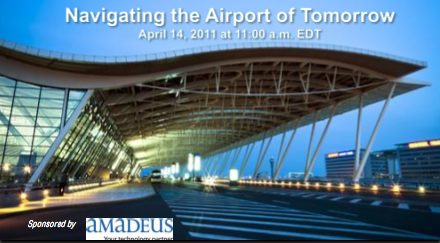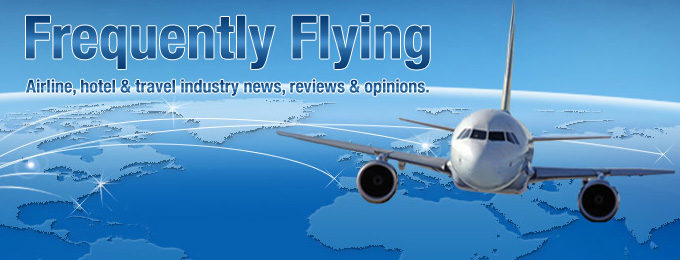 Yesterday, I listened in to the Air Transport World/Amadeus webinar entitled “Navigating the Airport of Tomorrow,†with presentations by Norm Rose, President-Travel Tech Consulting, Inc., and Patricia Simillon, Head of Airline Operations Strategy for Amadeus. The hour-long webcast summarized the similarly titled report completed late last month & linked here.
Yesterday, I listened in to the Air Transport World/Amadeus webinar entitled “Navigating the Airport of Tomorrow,†with presentations by Norm Rose, President-Travel Tech Consulting, Inc., and Patricia Simillon, Head of Airline Operations Strategy for Amadeus. The hour-long webcast summarized the similarly titled report completed late last month & linked here.
The focus of the presentation offered a forward-looking view of how technology can enhance customer experience, provide revenue opportunities for airlines, airports & merchants, and increase overall efficiencies for everyone involved in the airport experience.
Specifically, discussion was aimed at how the evolution of our mobile devices (iPhones, iPads & other smart phones) is driving the need for real-time airport information and flight updates, as well as provide the airports & airlines improved customer-specific service. I offer a few of my notes below.
- Data was compiled from a JD Powers survey of about 3,000 global travelers noting specific “pain points†at airports today, with security wait times, flight disruptions (delays/cancellations) and baggage issues revealed as the top complaints.
- The disconnect between airline operations, baggage service & reservations systems causes inability to seamlessly manage disruptions. Need exists to fully connect stand-alone systems to offer immediate resolution via mobile technology and/or at a single kiosk.
- Airports have an opportunity to use NFC (Near Field Communication) chip technology to enhance airport shopping (e.g., specific coupons pushed directly to your phone for nearby airport shops).
- NFC technology can automate baggage check-in & tracking for those with RFID chips (Radio Frequency Identification). Qantas currently offers these chips free to elite members, and for purchase to other passengers.
- Disruption management was called out as the biggest area of opportunity for airlines to send real-time data with the ability for passengers to make changes, get flight updates, and even go as so far to offer compensation on the spot electronically.
- Real-time information should be personalized, location based (where you are inside the airport), and context aware (providing the correct info needed at the right time, at the right place).
- Airlines should invest more in selling ancillary products and services through mobile devices.
- Biometry could enhance passenger identification, and perhaps streamline future “trusted traveler†programs for security screening. Data would come from the NFC chip in your mobile device when scanned.
- Roaming airline agents could be armed with tablet devices to manage customer service issues while standing in line. Perhaps so far as to negate reaching an agent at the counter by updating passenger reservations electronically & pushing revised itinerary details & boarding passes to your phone.
- Current third-party apps that manage itineraries, airport information & flight status would need to evolve to incorporate this new all encompassing real-time functionality.
- When something goes wrong (delay, cancellation, weather, security wait times), the airline being flown takes the brunt of the blame by passengers, so the need to appropriately manage customer expectations is paramount.
- A more informed passenger with accurate real-time data will enhance the airport experience, as well as provide great efficiencies & revenue opportunities for airlines, airports and third-party vendors.
During the presentation, the video linked here was shown revealing what the experience might be like with the above enhancements. Privacy concerns were also mentioned throughout the presentation, specifically noting that push notifications and NFC capabilities would be on an opt-in basis determined by the traveler.
As far as immediate electronic compensation for service disruptions, I think the airlines might be less willing to offer this, given they currently enjoy breakage in unused paper vouchers that have to be mailed in or redeemed at the airport.
I personally would enjoy this future airport experience, and think it’s pretty realistic in the timeframe provided between today and 2015 to 2020. Technology is certainly driving the future of air travel, and I’ll definitely try out and review each new enhancement that eventually rolls out.

